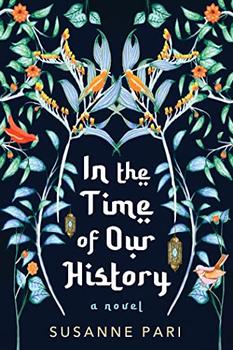Summary | Excerpt | Reading Guide | Reviews | Beyond the Book | Readalikes | Genres & Themes | Author Bio

Yusef topped off his tea and leaned back into the desk chair. "Get Kareem on the phone and tell him I want the punch list on my desk by this afternoon. Have Nezam report to me as soon as he gets in. Take a letter." Vivian flipped to a fresh page in her steno pad. "Attention: Mr. Francis Fogarty, Fogarty Investments—send it to his home address, Vivian." She nodded. "Dear Frank, It was a pleasure to run into you and ... uh—find out the wife's name—last weekend at the country club, period, new paragraph. As per our conversation, I am very interested—correction, I am extremely interested in viewing your family property in Maryland, period. While the market in the area is very depressed, a rural property is something my wife and I are considering for our retirement, comma, a place for our family to gather, period, new paragraph. Please call me at your convenience so we may arrange a meeting—period. Looking forward, et cetera. Sincerely, et cetera."
"Would you like this on your personal letterhead, Mr. J?"
"Yes, the Joseph Jahani one. And tell Pirooz to research the demographics of Cambridge, Maryland, with the idea of putting a golf resort on that property."
"Pirooz isn't in today, Mr. J. His wife had the baby last night."
"He's taking the whole day off?"
"I believe so."
Yusef shook his head disapprovingly. "What did they have, then?" he asked.
"A boy. Ali."
He sighed. "Jesus. Another Ali." He dismissed Vivian with two fingers and reached for the Wall Street Journal.
* * *
Vivian sighed and slipped her shoes off under her desk. Her boss was particularly antsy this morning, and she knew it was because Mitra had come to town. There was nothing more irritating to him than his eldest daughter. She propped her bunioned feet on the extra chair, the one her part-time clerk used, the one a teenaged Mitra had used twenty years ago when she worked at the office during the summers. She'd often sneaked away from the reception desk to peer over Vivian's shoulder at the ledgers and to complain about her father, imitating his accent and mannerisms so perfectly that Vivian dissolved into paroxysms of laughter. Once, she took Vivian's eyebrow pencil and drew herself a thin mustache so she could better act the role; stiffening her back, expanding her chest, pointing a finger in the air, she delivered a speech on the merits of stenography according to her father: Eighty vords a meenute; a girl is vorth nossing widout dat. Vhat happens if your husband loses his job? Eighty vords a meenute and polite phone answering vill save you.
That girl had no fear of the man; and the other one—Anahita—all she had was fear. She'd worked at the office only one summer, answering phones in the sweetest way, tolerating every snobby secretary who called and every brash salesperson who walked through the main door, in a way that made her father proud. But being perfect took its toll, and Vivian had found Ana sniffling in the restroom several times. Mitra, on the other hand, had once told a flirtatious union official that if he didn't smell like a sewer in ninety-degree weather, she might consider thanking him for staring so blatantly at her breasts. Another time, Mitra told the mayor's secretary—a consistently rude person—to call after her PMS was over. She would beg anyone to take her place at the reception desk so she could prowl the firm's nooks and crannies; examining blueprints and schematics; shuffling through bidding contracts; memorizing the names of floor tile samples, concrete textures, and roofing material. On her lunch break, she often persuaded one of the general contractors to take her along to walk a project; she kept a yellow hard hat and work boots in the trunk of her Fiat Spider. Once in a while, she sidled her way into the conference room, sat in a corner to listen as her father and the subcontractors battled with the architects over how to bring their designs in line with the reality of costs. He allowed this only because he didn't want to risk her sassing him in front of the other men, but the rest of the time, he went out of his way to speak down to her, show her how inconsequential she was; he was determined to break her spirit, or at least to mold it into one of a conventional girl, a fifties throwback, like her mother. But she was unfazed. She kept coming back every summer, and sometimes after school if she wanted to learn the details of a new project. Mr. J wouldn't let himself see how involved she was, how she could have been his natural successor, far more capable than any of the boys who came later, some of whom were a drag on the business, but secure in their jobs because they were family and, of course, male.
Excerpted from In the Time of Our History by Susanne Pari. Copyright © 2023 by Susanne Pari. Excerpted by permission of Kensington Publishing. All rights reserved. No part of this excerpt may be reproduced or reprinted without permission in writing from the publisher.




Courage - a perfect sensibility of the measure of danger, and a mental willingness to endure it.
Click Here to find out who said this, as well as discovering other famous literary quotes!
Your guide toexceptional books
BookBrowse seeks out and recommends the best in contemporary fiction and nonfiction—books that not only engage and entertain but also deepen our understanding of ourselves and the world around us.